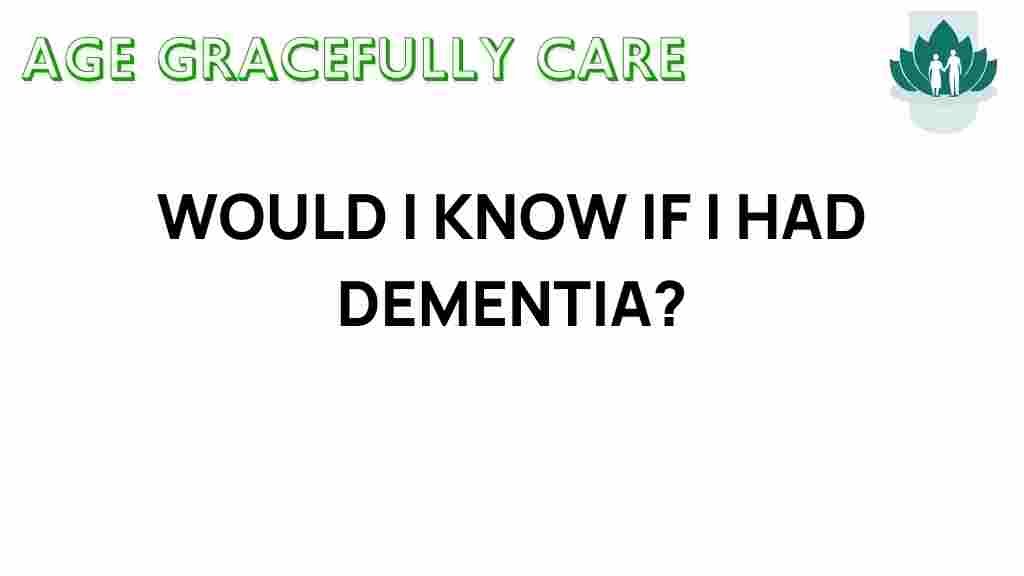Unraveling the Mystery: Would You Recognize Early Signs of Dementia?
Dementia is a term that encompasses a range of cognitive impairments that can affect memory, thinking, and social abilities severely enough to interfere with daily life. As the population ages, awareness of dementia and its early signs is becoming increasingly important. This article aims to help you recognize the early signs of dementia, understand its implications, and foster better mental health through awareness.
Understanding Dementia and Cognitive Decline
Dementia is not a specific disease but rather a general term that describes a decline in cognitive function that affects the ability to perform everyday activities. The most common type of dementia is Alzheimer’s disease, but there are several others, including vascular dementia, Lewy body dementia, and frontotemporal dementia.
The process of cognitive decline can begin years before noticeable symptoms appear. Recognizing early signs of dementia is crucial for timely intervention. Here are some common early indicators:
- Memory loss that disrupts daily life
- Challenges in planning or solving problems
- Difficulty completing familiar tasks
- Confusion with time or place
- Difficulty understanding visual images and spatial relationships
- New problems with words in speaking or writing
- Misplacing things and losing the ability to retrace steps
- Withdrawal from work or social activities
Step-by-Step Process to Recognize Early Signs
Recognizing the early signs of dementia involves a careful observation of cognitive abilities and changes in behavior. Here’s a step-by-step process you can follow:
Step 1: Self-Assessment
Start by assessing your own cognitive health or that of a loved one. Consider the following questions:
- Have you noticed any significant memory loss?
- Are you having trouble concentrating or following conversations?
- Do you struggle with familiar tasks, like cooking or managing finances?
Step 2: Observe Behavioral Changes
Look for changes in behavior that may indicate cognitive decline:
- Increased confusion about time or place
- Withdrawal from social engagements
- Uncharacteristic mood changes or personality shifts
Step 3: Document Symptoms
Keep a journal of the symptoms you observe. Note when they occur, their frequency, and any patterns. This information will be valuable when discussing concerns with a healthcare professional.
Step 4: Seek Professional Evaluation
If you or a loved one exhibit significant changes, consider scheduling an appointment with a healthcare provider. A proper diagnosis often involves:
- A thorough medical history
- Cognitive and neurological tests
- Brain imaging, if necessary
Common Misconceptions About Dementia
There are many misconceptions surrounding dementia and its early signs. Here, we dispel some of the most common myths:
- Myth: Dementia is a normal part of aging.
- Fact: While age is a significant risk factor, dementia is not a normal part of the aging process.
- Myth: Memory loss is the only symptom of dementia.
- Fact: Dementia involves a range of cognitive impairments, including difficulties with reasoning and language.
- Myth: If you have memory problems, you have dementia.
- Fact: Memory issues can arise from various conditions, including stress and depression, and do not necessarily indicate dementia.
Troubleshooting Tips for Early Detection
Improving awareness of dementia and its early signs is crucial for fostering brain health. Here are some tips that can help:
- Maintain a Healthy Lifestyle: Regular physical activity, a balanced diet, and adequate sleep can significantly improve brain health.
- Engage in Cognitive Activities: Puzzles, reading, and learning new skills can help keep the brain active and engaged.
- Stay Socially Connected: Regular interactions can bolster mental health and combat feelings of isolation.
- Regular Health Check-Ups: Routine medical evaluations can help identify cognitive changes early.
Age and Dementia: What You Need to Know
The likelihood of developing dementia increases with age, particularly after the age of 65. However, it is essential to understand that aging does not guarantee cognitive decline. Here are some key points to consider:
- Many older adults maintain cognitive functions well into their 80s and beyond.
- Genetics plays a role in the risk of developing dementia, but lifestyle choices can mitigate some risks.
- Engaging in brain-healthy activities can promote cognitive resilience.
Getting a Diagnosis: What to Expect
If you suspect that you or someone you know may be experiencing signs of dementia, getting a diagnosis is essential. Here’s what to expect:
- Initial Assessment: A healthcare provider will take a detailed history and perform cognitive tests.
- Physical Examination: A physical exam can help identify other medical issues that may affect cognition.
- Brain Imaging: Imaging tests, such as MRI or CT scans, can help rule out other conditions affecting brain health.
- Follow-Up: Diagnosis may require follow-up appointments to monitor changes over time.
Conclusion: The Importance of Awareness
Awareness of the early signs of dementia is paramount in addressing cognitive decline proactively. By understanding the implications of memory loss and other cognitive symptoms, we can take the necessary steps to promote brain health and support mental well-being.
Remember, if you or a loved one are experiencing concerning symptoms, consult a healthcare professional. Early diagnosis can lead to better management and improved quality of life.
For more information on mental health and aging, visit this resource. Stay informed and proactive about cognitive health.
By fostering awareness and understanding of dementia, we can support ourselves and our loved ones in navigating the complexities of aging and cognitive decline.
For additional resources on dementia, you can check out this link.
This article is in the category Health and created by AgeGracefullyCare Team
